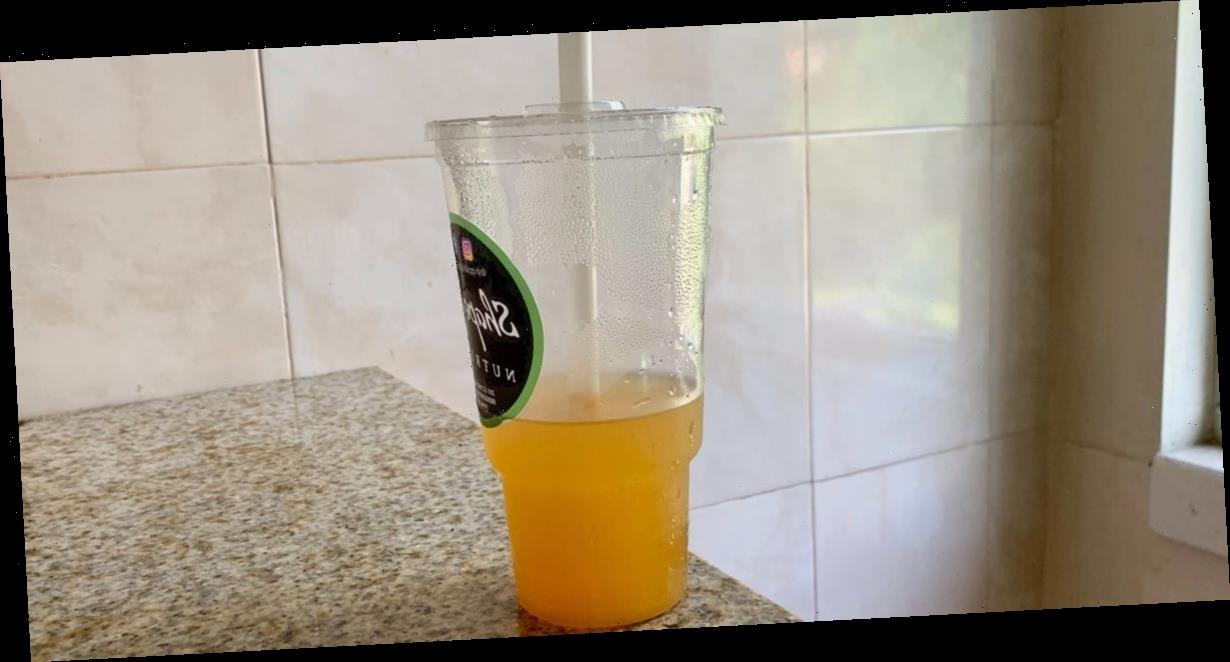- Brightly-colored loaded or boosted teas have recently blown up on social media, touted for boosting energy, burning fat, and speeding metabolism.
- Though they're low-calorie, nutritionists say they aren't much better than energy drinks, and rely on large doses of caffeine and supplements unregulated by the FDA.
- There's no evidence to back up their claims of health benefits, and side effects can include jitters, diarrhea, cramps, and increased heart rate and blood pressure.
- Visit Insider's homepage for more stories.
With eye-catching neon colors and striking flavor names like "Bahama Mama" or "Captain Marvel," loaded teas seem to have become the new star of Instagram this past summer, offering enticing benefits like more energy, a faster metabolism, or an easier way to lose weight.
But there's nothing science-backed about those claims, experts say, and without clear labeling or regulation it may be impossible to know whether indulging in one could lead to side effects.
Sometimes known as "boosted" teas, these beverages aren't new — they've been around since the early 2000s, at least. The most recent wave appears to have peaked this past summer, according to Brigitte Zeitlin, a registered dietitian and owner of BZ Nutrition.
"Because of social media, there seems to be a new 'it' drink that offers unfounded health benefits, and that trend is only going to continue to rise and get more popular," she told Insider.
Loaded teas aren't regulated, and don't need to disclose ingredients
Many of the drinks come from distributors with multi-level marketing giant Herbalife, or variations of companies selling "flat tummy tea." Regardless of the brand name, the advertisements are similar, with the teas touted to boost energy, rev your metabolism and burn fat, all in a delicious low calorie, sugar-free package full of vitamins.
But what's actually in the drinks isn't always apparent, Andy Bellatti, a registered dietitian and nutritionist, told Insider. And, since dietary supplements aren't regulated by the FDA, there's no reliable way for consumers to be sure,
"My main concern is that nutritional supplement products are not regulated. So, you don't know what you're actually getting — or in what dose," he said.
They are high in caffeine, which can be harmful in high doses
The most popular ingredient in boosted teas is caffeine, the same as in nearly every other energy product on the market. It can come from plant-based sources like black or green tea or guarana (a coffee-like fruit native to Brazil), as well as in the form of concentrated caffeine powder.
In either case, caffeine is extensively researched and can increase energy levels and suppress appetite (which can also make it useful for weight loss). But it can have serious and even dangerous side effects in large amounts and loaded teas often come in large serving sizes without clear labeling, but could contain as much caffeine as several large cups of coffee. As a result, users could experience issues like insomnia, anxiety, rapid heart rate, nausea, and jitters.
Herbalife, acknowledging concerns about the caffeine in their products, said the company seeks to educate vendors about safe limits. "Every day millions of people around the globe enjoy Herbalife Nutrition products and like other companies that serve caffeinated beverages, we actively educate and advise distributors and consumers about the responsible use of caffeine," Jennifer Butler, Herbalife's vice president of communications, told Today.com.
Common additives include concentrated blends of B vitamins
Another common additive is B vitamins which, on the surface, sound healthy. They're found naturally in whole grains, meats, seeds, and leafy vegetables, and can help boost energy.
However, highly-concentrated powders and mixes can contain huge doses of B vitamins that are linked to side effects. These can include nausea, rapid heart rate and red or flushed skin, symptoms of toxicity that don't occur in the low doses you'd get from whole foods, according to Zeitlin.
"The source of B vitamins matter and the amount of B vitamins matter and this tea does not have to be honest with us about either," she said.
Finally, in order to provide attractive flavors and sweetness while staying low-calorie, loaded teas tend to replace sugar with substitutes like sugar alcohols, some of which can cause bloating and digestive issues.
There's no evidence they can burn fat or boost metabolism
In addition to not regulating the ingredients, the FDA also does not hold supplements brands accountable for any health claims, and there's no clinical research backing up their safety or effectiveness.
Claims that loaded teas can help with weight lose, fat reduction, or metabolism boosting aren't based in any science Zeitlin said.
There is evidence caffeine can boost metabolism a bit, at least in the short term, making it popular for weight loss products. But there's nothing in loaded teas that would appear to give them a weight-loss advantage over an ordinary cup of coffee.
And, as noted above, the side effects likely outweigh the possible benefits, Zeitlin said, so if you're looking for a way to get more energy, feel better, or lose weight, there's really no short-cut. A healthy diet, rich in fruits and vegetables as well as plenty of plain water for hydration, is your best bet, and these teas aren't a realistic substitute.
"In other words, buyer beware…and if you were my client, I would also add, buyer step away from the tea!" she said. "Always keep in mind that if it sounds too good to be true, it is. Anything that is promising a quick-fix should be a big red flag to you."
Read more:
A woman who overdosed on enough caffeine powder to make 56 cups of coffee was hospitalized for a week, and doctors say her birth control didn't help
Eating a lot of processed foods could cause your body to age more quickly, a new study suggests
CBD is a cannabis compound used to treat everything from pain to anxiety. Here's how to use it safely.
Source: Read Full Article
